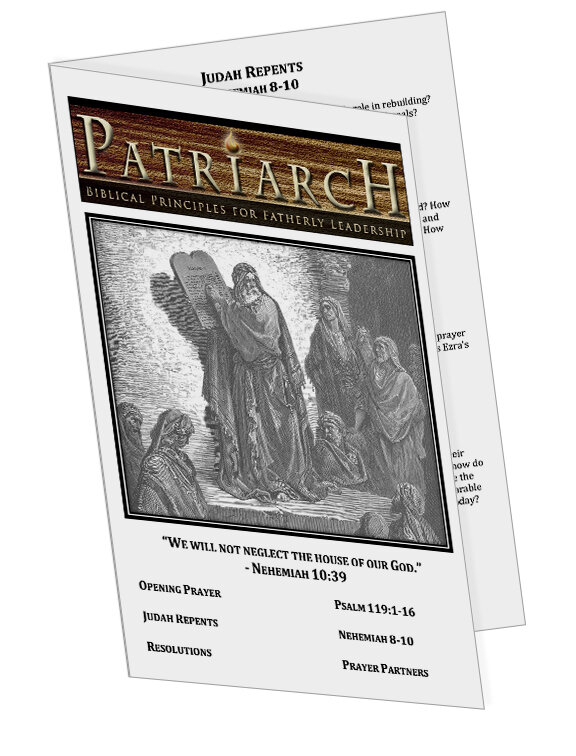“We will not neglect the house of our God.”
- Nehemiah 10:39
Opening Prayer Led by Group Facilitator
Psalm 119:1-16
Pray the Psalm together aloud, alternating verses between two sides. When finished, share reflections as a group
1 Blessed are those whose way is blameless, who walk in the law of the Lord!
2 Blessed are those who keep his testimonies, who seek him with their whole heart,
3 who also do no wrong, but walk in his ways!
4 Thou hast commanded thy precepts to be kept diligently.
5 O that my ways may be steadfast in keeping thy statutes!
6 Then I shall not be put to shame, having my eyes fixed on all thy commandments.
7 I will praise thee with an upright heart, when I learn thy righteous ordinances.
8 I will observe thy statutes; O forsake me not utterly!
9 How can a young man keep his way pure? By guarding it according to thy word.
10 With my whole heart I seek thee; let me not wander from thy commandments!
11 I have laid up thy word in my heart, that I might not sin against thee.
12 Blessed be thou, O Lord; teach me thy statutes!
13 With my lips I declare all the ordinances of thy mouth.
14 In the way of thy testimonies I delight as much as in all riches.
15 I will meditate on thy precepts, and fix my eyes on thy ways.
16 I will delight in thy statutes; I will not forget thy word.
Glory be to the Father, and to the Son, and to the Holy Spirit.
As it was in the beginning, is now and will be forever. Amen.
Judah Repents
1. What is Ezra’s role? How is it complementary to Nehemiah’s role in rebuilding? How have you found complementary partners for your purposes and goals?
2. Why would the people of Judah weep at hearing Moses’ words proclaimed? How are they prompted to celebrate and feast? How are they prompted to fast and repentance? Whose proclamation of God’s word have stirred your heart? How have you feasted and celebrated? How have you fasted and repented?
3. What stands out in Ezra’s extended prayer in Nehemiah 9? How is Ezra’s prayer historical? How is Ezra’s prayer relevant to his own time? In what ways is Ezra’s prayer relevant to our time?
4. After the reading of the Law (Ch 8), the celebration of the Feast (Ch 8), their penitential confession (Ch 9), and Ezra’s intercession before God (Ch 9), how do the people respond in Chapter 10? What do they express? What would be the fruits of such intentional public re-commitment? Is there anything comparable in your experience? How would such a response be publicly expressed today?
Resolutions
Choose a resolution for this week from the suggestions below or make your own. Tap on a resolution to email it to yourself:
1. I will examine ways I have been ridiculed for my faith and will record ways I have learned to respond. I will share what I have learned with my children.
2. I will go to prayer by myself this week and discuss a goal that I have with the Lord. Following prayer, I will write down a strategy for achieving that goal.
3. I will thank someone in my life who has taught me integrity.
4. I will discuss with my wife how we can share our material blessings with someone who has experienced exploitation.
5. I will reflect on the motives of any enemies I have in my life and will compose a plan to respond to the motives of their opposition to me.
6. I will offer up a fast this week for someone who has treated me unjustly.
Prayer Partners
Discuss with your prayer partner the success/failure of your previous resolution & offer a vocal prayer for one another.
Banner Image: "Ezra Reads the Law to the People" by Gustave Doré [Public Domain], via Wikimedia Commons
Scripture quotations are from the Revised Standard Version of the Bible—Second Catholic Edition (Ignatius Edition) copyright © 2006 National Council of the Churches of Christ in the United States of America. Used by permission. All rights reserved.





